The Boy in Striped Pajamas
We were sitting in my friend Andile’s dorm room. The curtains blocked out most of the afternoon sun. The sickly blue glow from his laptop gave off the only illumination. “The Boy in Striped Pajamas.” I’d never seen it before. We watched the small boy, shaved head and sickly skin smile at the notion of a friend. “You know, sometimes I think the Holocaust was much worse than Apartheid. Yeah.” I don’t respond. “Because the children. The children in Apartheid were indirectly affected. But the children in the Holocaust, they were directly affected.”
Considering. “Yes.” Breaking my eyes from the screen to look at his. “But those children’s children are also indirectly affected. And their children will be indirectly affected…and possibly their children’s children. When does that end?”
Comfort Food
Life in Cape Town has become comfortable. I have begun to know the streets in Obz like an old pair of jeans that always fit, no matter how many doughnuts you indulge in. The constant presence of Table Mountain has become our weather broadcaster and her mood determines where my Levi rain jacket spends the day. Weekday mornings begin the same, sunlight peeping through the blinds of K1. Children’s joyous outbursts, faint yet distinct, are a seven thirty alarm from the primary school on Wrench.
I would rather hear the and hooting of kombis, “Mowbreee, Whiiineburg!!”, than the low rumble of Milwaukee buses. I can’t quite remember if it’s Pick and Pay or Pick and Save that I prefer to shop at, and it’s nearly subconscious to walk on the left side of the sidewalk.
Last week I went to a play, “Flipping the Script.” Auntie Jenni called at 9am: “Hello luv. Listen, are you still at your house?” Her voice is always so pleasant, motherly even.
“Yeah, we’re leaving just now.”
“Is it? Lovely, because you know what? I forgot that the ladies are going this morning to a play and I thought it might be nice if you could come. It starts at 10, do you think you could have your driver drop you?”
“That’ll be nice. I will see you there.”
“Alright. Cheers darling!”
“Cheers!” I echoed. I have begun to look forward to my semi-routine at Place of Hope. I love walking into the krich Wednesday and Thursday mornings, “Môre môre my babas!” I greet their running hugs and sloppy kisses with. Somewhere between July and September they evolved from small adorable bundles with runny noses to little people whose quirks make me smile affectionately. They’ve wormed their way in. I treasure my time with the women on Thursday afternoons, flour streaking my cheek as I teach them how to bake. Relying on the hours spent with my mother in the kitchen to tell me what a cup, a teaspoon or a half-tablespoon looks like in the absence of any devices of measurement. But I like these days too- when the schedule is thrown out the window and once again I become the full time student.
The play stared four women, and their experiences with domestic violence. It was brilliantly done, incredibly well acted. Held in a large open room in one of the women’s shelters just outside Athlone, the lighting and scenery were minimal, but the effect wasn’t lessened. Each woman represented a faction of the rich diversity that exists in South Africa. An old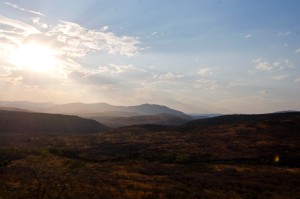 Xhosa woman, raised in the Eastern Cape and living out the last of Apartheid in the Cape township of Langa, told the story of a sexist society in a racist country. She spoke of her childhood in the bantustans, the “homelands,” the “tribe lands,” the Eastern Cape. Two weeks ago we drove through the bantustans along the garden
Xhosa woman, raised in the Eastern Cape and living out the last of Apartheid in the Cape township of Langa, told the story of a sexist society in a racist country. She spoke of her childhood in the bantustans, the “homelands,” the “tribe lands,” the Eastern Cape. Two weeks ago we drove through the bantustans along the garden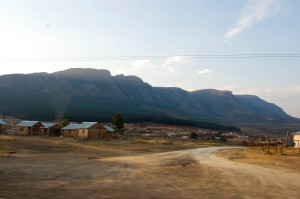 route. Stunning, enticing, and somehow untouchable, the image of her childhood home came clearly to mind. I knew why she would have loved growing up there, childhood always makes a game of the wilderness and low provisions. I knew why she would want to get out when she married, knowing that in the homelands opportunity is as arid as the landscape. As she spoke, her story was comfortable, the intermittent Xhosa words ringing familiarly in my ears.
route. Stunning, enticing, and somehow untouchable, the image of her childhood home came clearly to mind. I knew why she would have loved growing up there, childhood always makes a game of the wilderness and low provisions. I knew why she would want to get out when she married, knowing that in the homelands opportunity is as arid as the landscape. As she spoke, her story was comfortable, the intermittent Xhosa words ringing familiarly in my ears.
Next to her, a Muslim Indian woman in a delicately embroidered punjabi sat. She spoke of her marriage and of childhood and then of cooking. As her words turned to food her face lightened. “Masala, curries, jeera, saffron, turmeric”… like the spices in Victoria Square market. Steeping the air with flavor, the colorful powders heaped in bowls and shallow dishes called out to passers by. It was our second day in Durban when we ventured downtown to experience the city. Tropical, humid and oppressively hot, Durban seemed a world of it’s own in contrast to Cape Town. Victoria square market, the largest indoor market in South Africa, was a destination we couldn’t pass up. Driving through the streets, vendors sat in makeshift stalls along the sidewalks selling everything from cabbage to sink parts. Walking into the market, the air hung heavy with sweat and dirt. Stalls were crammed with as many artifacts as possible. African beadwork, ebony carvings, ostrich eggs, drums, bone rings, ivory pipes, saris, punjabis, zebra skins, paintings, tapestries, spices, stings of marigolds, embossed tin, leather products overwhelmed the senses. Durban, a fusion culture, the melting pot of India and Africa, with all the charms of third world. Opposite Victoria Square a mosque stood in royal magnificence, a block away from Vodacom cell offices, and just over five km from the kiss of the Indian ocean. We stopped for lunch along the crowded street, and I’ve never been so happy for paneer; masala paneer. I know why those spices would make her smile.
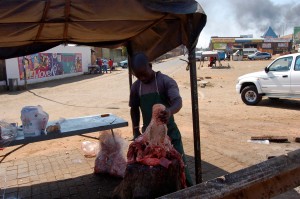
Smilies. Usually sheep or cows head that is boiled into a stew. Pap is a maize meal dish similar to cream of wheat.
A younger Xhosa woman stood stage right; strong, independent, afforded the luxury of a white education under Apartheid rule, she was battling to resolve the constant question: “who am I?” This was the first question Chris asked us in Friday afternoon theology. “Who are you?” He posed the question like an egg about to hatch. Apartheid is just a macrocosm of the separation we have inside… The Bible shows us three separations; one from God, the second from each other, and the third from ourselves. As human beings it is our mission to resolve these separations, these apartheids. Antjie Krog, South African poet laureate and my Tuesday evening African literature professor calls this separation modernity. As we work our way through the top ten African novels of the century, the reoccurring theme is a search for coherent self-identity. While her roots were in the townships, her comfort foods pap and smilies on the braai, her education placed her in a world of china and flatware. But, I don’t think this is a problem just for the colonized.
The fourth was a white woman. Eccentric and nicotine addicted, she spoke of an ‘almost’ charmed life. Raised on the slopes of Table Mountain every luxury was afforded her, except freedom. The family image was much more important than her personal happiness. And so, like the others she was caught in the undertow of silently abused victims. Eventually it cost them their lives, all four.
I looked around at the women sitting next to me. Bon looked at me and giggled as the younger Xhosa woman said some profanities in Afrikaans. Kristi smiled nervously, and Angela laughed heartily. Loretta handed me her 9 mo. old and switched her attention back to the scene on stage. I have become a comfortable part of this community, accepted as a sister, auntie and friend. I looked at Veronica. Last week she came up to me smiling with a letter and picture in her hand. “Cate! Look, see this is him.” An 11mo. old baby boy chortled for the camera, and the letter (in 5 pages) explained he was doing well, and they had named him “Denver.” She was proud of him, despite her reasons for giving him up. Only 24, and already a mother of two, she just couldn’t look at the face of this little boy every day without thinking of the rape that created him. She’d told me weeks earlier as we sat watching the children play in the back yard. The bricks of Place of Hope pushing uncomfortably into our backs. I’d held her hand, knowing that often there’s no response necessary. So this was the German couple she’d handed her bundle over to. He looked happy, and she was proud.
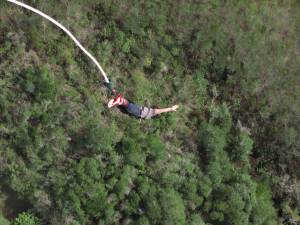
Me!
It is the warmth of the communities I have enveloped myself within that have become my South African comfort food. Not just the women and children of Place of Hope, but also my housemates. Our third day of Spring Break we stood, toes to the edge of life, and cheered each other on as we all took a leap of faith. Bloukrans gorge was stunning; a perfect place for the tallest commercial bungee jump in the world, 216m. As we walked across the underside of the bridge, nerves boiled and bubbled in our stomaches. Loud house music filled the atmosphere, and for lack of any other way to release our nerves we danced and laughed together. One by one we stepped forward, were strapped in, taken to the edge, and then “1, 2, 3, BUNGEEEEEE!” Amongst the cheers of our comrades we jumped out into nothingness. The air rushed past, and the ground came closer, and silence, as each of us free fell for the longest 5 seconds of our lives. There is a brief, yet passive thought saying, “I’ve just propelled myself off the 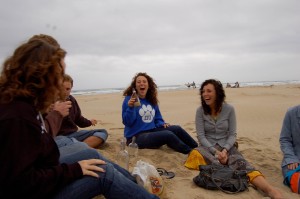 tallest bridge in Africa”, but then the bungee catches and I swing back up. Bouncing, spinning, taking in the view for the first time upside down. When we were brought back up everyone cheered. We smiled at each other and gave hugs and exclamations of how brilliant the fall was. Our eyes were glazed over with wind and adrenaline, and then we turned to cheer for the next friend. The next night we would spend on the beach in Chinsta, bottles of wine in hand (thanks to no open container laws), recounting the events and laughing as the Indian ocean crashed in the sand.
tallest bridge in Africa”, but then the bungee catches and I swing back up. Bouncing, spinning, taking in the view for the first time upside down. When we were brought back up everyone cheered. We smiled at each other and gave hugs and exclamations of how brilliant the fall was. Our eyes were glazed over with wind and adrenaline, and then we turned to cheer for the next friend. The next night we would spend on the beach in Chinsta, bottles of wine in hand (thanks to no open container laws), recounting the events and laughing as the Indian ocean crashed in the sand.
-“My humanity is bound up in yours, for we can only be human together.”- Desmond Tutu
Glass Bottles
Friday. August 7, 2009
She laughs. Then as though oddly aware of an audience, “We have fun together. Does that sound strange?” We shake our heads, but I guess, “It does to some people.” It didn’t sound so strange though. Not now.
She was dressed well. A freshly ironed white blouse, large red beads laying heavy on her chest and an orange sweater slung over her shoulders. Her hair was bleached, sitting right below her chin. She didn’t look quite American, but the accent gave her away. He sat next to her, his dark skin in sharp contrast to hers. His dress was simple; a dark blue polo, dark pants. He seemed quiet, reserved. He must have been nearly twenty years her junior. But when they smiled, they weren’t such an odd couple.
As a formality she introduced herself: “I’m Linda Biehl. And this, is Ntobeko.” But of course, we already knew.
The room was cozy, but familiar. Located on the tenth floor of the ABSA bank building down town, the Desmond Tutu Peace Center is unpresumptuous. We first heard this story here, on a taped CNN report from ’96. Amy Biehl, a Fulbright scholar and Stanford graduate, was studying politics and democracy in Cape Town in the early 90’s. She was bright, driven, and passionate. The connections she made working in Washington DC aided her labor in pushing South Africa towards a democratic government. Nearing the end of her two-year stint, she was brutally killed while dropping off friends in the black township, Kayalitcha. The story got international press, and the four men responsible for her senseless murder were eventually detained. When the Apartheid government was overthrown, these men were involved in the Truth and Reconciliation trials (TRC) led by Desmond Tutu. Amy’s parents traveled to South Africa for the trials, and asked for amnesty for their daughter’s killers, because “that’s what Amy would have wanted.” Following the release of the men, Linda and Paul Biehl started the Amy Biehl foundation in Cape Town. The mission is to provide support to schools in the townships through after school programming and enrichment programs. Soon after it’s formation, one of the four murderers came to work for the organization. Ntobeko now co-operates the NGO with Linda. This is a story about forgiveness, and the nearly incomprehensible ability of a mother to pardon her daughter’s killer. It is a story of inexplicable virtue and reformation, or at least, isn’t it pretty to think so.
“Many people think the story begins on the 25th of August, 1993. But it began long before that.” Ntobeko starts calmly, softly. “Apartheid was a day to day activity, a reality.” Growing up in the black townships at the time, you became involved in a resistance movement quite young, it’s just what you did. When you got to school age you began to realize what was going on, you began to realize that life was not fair. Some days there would be “police shooting at high school students. And some kids die. And you go home and tell your parents, and they are not shocked.” When you are growing up there are many things that you must go without. We often went to school without lunch. But the one thing that you could not forget was your Vaseline. “It was the only thing you could not afford to leave. Because as you run from the tear gas the police are shooting, you rub it on your eyes and nose and mouth. Because when you are young the gas stings and your throat closes up, and you stop breathing… So we began to fight for the cause.”
This was the story we came to hear. The one that rarely gets told. The one that starts with Mace and glass bottles. “Before there were plastic bottles, water was delivered in glass bottles. In Primary school we began to collect those bottles. We would gather those bottles and bring them to KTC- the mother of all informal settlements.” The children were selected for the job because they didn’t need passbooks to travel around, and they looked less suspicious. “They would use those bottles to make petrol bombs that they would throw at police cars… Those glass bottles played a huge roll in our independence.” As you got older you became more involved in the anti-Apartheid movement. “We were students by day and militants by night. Most of us were not armed. We were told to go to the hardware store, buy a hammer and put it in your book bag. Then when you are walking home and you saw a policeman, then you hit home in the head, and you are armed.” His face contracts remembering, though the words are tired. And in some sense, Apartheid is still part of his reality.
As political tensions rose in the country, the townships became more and more violent. “The goal was to make South Africa totally ungovernable.” It was planned, strategic and as well organized as any governance. “Amy died under Operation Great Storm. The mission was to shoot and kill before you were shot.” He explains slowly. “We buried who we really were for the cause. We were to save, suffer, sacrifice. You get to a point when you are willing to die for the cause. And then you get to a point when you are willing to kill for the cause. You pick up the spear of the fallen soldier and you carry on.” And so Amy died because she was white. Because she represented the policemen, the need for Vaseline, the lack of jobs, the need for passbooks, the poverty, the violence and the separation. She wasn’t the first to die for the cause. She wasn’t the last. She was just, American.
“Everyone asks how you reconciled Mrs. Biehl. But I’m curious, how did you reconcile with killing someone Ntobeko?” Theresa hesitates.
Linda smiles, and Ntobeko pauses, choosing his words like brushstrokes to canvas. “The turning point was when I stood in front of the TRC. They asked me, ‘If you were granted amnesty, what kind of life would you lead?’ And I thought about it. When Linda and Paul spoke, asking that we be given amnesty I thought they could not be her biological parents. Parents don’t forgive like that. And I went back to my cell that night and tried and understand why. That forgiveness was most important to me; more than the decision of the TRC. Not those 18 years I would serve, because I knew I could shoulder it. I was in prison, and I didn’t lose my soul.” The two look at each other, knowing each other. “There was a formal TRC… but this process [of reconciliation] is so important. All the stories, all the day to day activities, they are part of it.”
“If we had not gone through the TRC we would not be sitting here right now. And we would be missing so much. It was an institutionalized process that allowed for personal reconciliation.” Linda picked up. “One of Desmond Tutu’s gifts to me is to learn to laugh, and take joy and not look at yourself with pity.” She searches our faces. “As much as there was horrific stuff done here, you can search down to the bedrock and find Ububtu in this country. It should be a shining light to the rest of the world on what can be possible.”
This was the story we came to hear. The one about struggle and separation and liberty and reconciliation. Amy’s death brought international attention to the anti-Apartheid movement in South Africa. “Amy always told me that she would rather be a number than a name. She would cut out news paper clippings: ‘100 blacks dead’ ‘9 blacks killed’ ’13 coloreds, 5 blacks dead.’ But anytime a white person was killed they had a full article with names and families and occupations included.” While it’s her name that’s been immortalized, she was the 1 who brought the world face to face with Apartheid. It is this context that creates the content of her story. And so it’s not so strange, not now, that they would laugh together, Linda and Ntobeko.
. . .
Part 3 of 3
Two To Remember
Friday. August 1, 2009
“EVERYONE GET UUUUUP!” Pat Duffey’s voice comes muffled through our door. I grab my watch off the bedside table. 6:07am. Ok, ok.
6:35 we clacked around the kitchen in heels and dress shoes.
6:42 we walked down a dark Kimberley Road towards Pearnel and Sharky, tea in hand.
6:47 the vans, eternally smelling of petrol, puttered us to Saint Georges cathedral downtown Cape Town.
7:02 the sun began to turn the sky a light periwinkle. We looked even more out of place than usual; dressed up and walking downtown before the South African Friday begins. Only construction workers and the destitute accompanied us in the streets.
Entering the cathedral our steps echoed in the empty hall. I was surprised at the barren pews. Filing towards the alter, a small chamber to the right of the stage came into view. Intimately set, there were about 40 chairs creating a square with a small, simple alter. We were early, and only a few of the seats were taken. Walking into the chamber, our soles were muffled in red carpet, and our conversations fell silent in reverence; in anticipation. It was cold in the room, but for once no one commented on the goosebumps prickling our arms.
Slowly the chairs filled. A tall woman in her early-sixties on crutches, and her husband. A well dressed elderly man with penny loafers. A young blonde with three small children. A beggar with a few shopping bags tied around his right shoe. Soon the empty seats were gone. The man with penny loafers began to hand us books: The Anglican Prayer. “Thank you” we hushed through smiles.
7:20 A small man dressed in the long green vestments ambles in from the back of the room. His hair already white, small rectangular glasses add distinction to age. He sets a book upon the alter, positioning it just so. Then pulling on the burgundy ribbon within it’s folds, he opens to a specific page. “We pray the Anglican prayer. Page 219.” There is a crinkling of rice paper as everyone flips hurriedly to the page. The silence is broken once again, as the small congregation begins in unison. Those of us with Catholic backgrounds stumble over the familiar, yet foreign words… “In the name of the Father, the Son, and the Holy Spirit. Amen.”
Then and only then, did former Arch Bishop Desmond Tutu look up at the room. A smile broke out over his being, as though joy so overwhelmed him that there could be no evil in the world. “Goodmorning” he offered.
“Goodmorning!” we beamed back at him.
“So many new faces.” He commented.
“Would you like to do introductions Father?” Asked a woman sitting opposite; her white hair resting just below her chin, adding an air of sophistication to her affluent South African accent. Desmond Tutu smiled again, and nodded.
A pause.
The woman gestured toward a group of us encouragingly. Ellen Eckamn, our academic director while in this program, stood from where she had been sitting with her husband, Frank. Throwing her hand out in our direction, “These are students that are here from Marquette University in Wisconsin. They are studying here for 5 months” she said in her best Bostonian accent. She sat, nodding more to herself than the room.
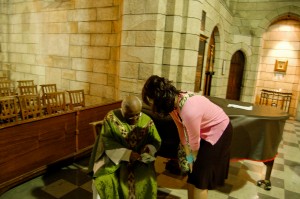 “Welcome” Mr. Tutu smiled. Then he craned towards the other side of the room, waiting. Another woman stood to introduce a group of European volunteers that will be working in Cape Town for the next 5 weeks. “Where are you all from?” He asked. They listed a series of countries, Germany and Scotland among the group. “I wish we were doing names” he said. Then, realizing the extended process it would be, waves his hand in dismissal of the thought. Once again he craned forward, eyebrows raised, poised to listen. The blond woman with her three children and husband spoke next: “We are on sabbatical. From the States” she said.
“Welcome” Mr. Tutu smiled. Then he craned towards the other side of the room, waiting. Another woman stood to introduce a group of European volunteers that will be working in Cape Town for the next 5 weeks. “Where are you all from?” He asked. They listed a series of countries, Germany and Scotland among the group. “I wish we were doing names” he said. Then, realizing the extended process it would be, waves his hand in dismissal of the thought. Once again he craned forward, eyebrows raised, poised to listen. The blond woman with her three children and husband spoke next: “We are on sabbatical. From the States” she said.
“Welcome.” He smiles again. Then leaning back off the alter, he looks to the left, with a questioning glance. The man with the penny loafers stands, reading the first scripture.
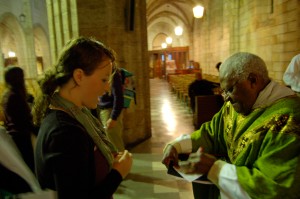 8:15 service was over, and Desmond Tutu walked out into the main cathedral to greet people as they left. Each of us stood in procession to shake his hand, then wait anxiously to see if he would sign our books and journals and postcards, or take a picture with us. Kelly walks over to me: “I’m never washing my hand again!” I thought about it for a moment, then the germaphobe inside thought better of it. I pulled out my camera instead, thinking it a better memorial.
8:15 service was over, and Desmond Tutu walked out into the main cathedral to greet people as they left. Each of us stood in procession to shake his hand, then wait anxiously to see if he would sign our books and journals and postcards, or take a picture with us. Kelly walks over to me: “I’m never washing my hand again!” I thought about it for a moment, then the germaphobe inside thought better of it. I pulled out my camera instead, thinking it a better memorial.
8:45 Tables were pulled together in a long line down the front of cozy Cafe de Roche. At the head of the table sat a white haired woman who carried the dignity of a self-awareness which only comes through a lifetime of service. To her right, a shorter, brunette with vivacious laughter. (It would later be explained to us that “these are my doctors.” The white haired woman heads the Desmond Tutu TB clinic in Kayalitcha. She also was the first doctor to examine Nelson Mandela when he was released from prison and “came to stay with us.” The brunette is a Dr. of Pediatrics at University of Cape Town). To her left, Desmond Tutu. People began to move towards 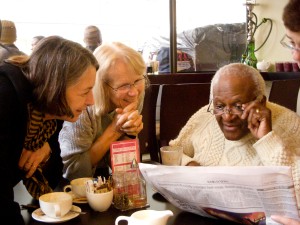 seats and Meghan and I, who had been most eager to leave the rain puddled streets, were pushed forward. Unsure, conscious of every contraction of my heart, I sat down, next to this fabled man. He didn’t acknowledge my inserted presence. Rather he concentrated fixedly on the croissant and preserves before him. “Tell us about your trip Father.” Said the white haired woman gently.
seats and Meghan and I, who had been most eager to leave the rain puddled streets, were pushed forward. Unsure, conscious of every contraction of my heart, I sat down, next to this fabled man. He didn’t acknowledge my inserted presence. Rather he concentrated fixedly on the croissant and preserves before him. “Tell us about your trip Father.” Said the white haired woman gently.
Deep breath.
I would not be part of this conversation, but allowed to be privy. Mr. Tutu started slowly, speaking of Fiji and rugby. They talked as old friends do when the threat of losing the other has long ago passed. Friday morning breakfast was a tradition among them for decades. These tables witnessed the destruction of Apartheid in these friends conversations long before it’s demise in 1994. These walls held tight the schemes of the ANC, and the coagulation of the TRC. But today they absorbed lighter discourse. “You’re leaving us soon Father.” Smiled the brunette. “You’re going to America to see Obama.”
“Oh?” Eyebrows raised, waiting to smile. Someone produces a paper.
“See here Father” the brunette points to a small article on the third page of the Cape Times. “ANGLICAN Archbishop Emeritus and Nobel Peace laureate Desmond Tutu has been awarded the Medal of Freedom, the highest US civilian honour. Dan Vaughan, Tutu’s personal assistant and spokesman, said Tutu would go to Washington to collect the award at a ceremony on August 12…” He laughes, not quite acknowledging and not quite dismissing the article. “Did you not know Father?” And he laughs again, expelling light into the room like a Patronus Charm.
“It must have been my smile” he jeers, artfully dodging the praise. And silently I agree. It must have been that smile Apartheid could not permeate.
. . .
Part 2 of 3
Fridays
Fridays are the only days of the week that all of our schedules overlap. In the morning we clamber into the vans and drive to UWC. As it always is, when all 19 of us are together, some sort of ridiculousness usually ensues and we arrive in fits of laughter to Sharon’s class. “Grassroot Organizations and Development” is a course designed by the Marquette program to allow us structured time to reflect and apply social theory to the work we are doing at our NGO (non-government organization) sites. Slender, and in her mid-sixties, Sharon’s body carries the mark of a lifetime in the South African sun. Every class period begins with an update of how our sites are progressing, and what we have done there in the past week. For the next two hours, there is a lecture of sorts on South Africa, the informal settlements, or social research. “Empowerment” she said in her high-pitched poise, “is a funny word. You cannot empower someone else. If you could, then you could take that power away. Rather, people become empowered.”
At 12:30 we pile back in with Sharky and Pearnel and take the N2 downtown. At St. Georges Cathedral we wind our way past the elaborate stone masonry and stain glass to the back courtyard. In a large, well lit room, black plastic chairs are set up in a semicircle around a stage. “Theology of Freedom, Reconciliation and Justice, is really a theology about you, about us.” Chris Ahrends’ words pour like silk sheets from his mouth; wrapping around us, and settling lightly over our shoulders. “Apartheid was the murder of the human spirit. It made people disposable” he tells a captivated audience. “Part of the reason we have so much violence in this country now is because of this disposability. Context creates content” and we nod, jotting a few notes in our journals.
Some weeks, one of these classes will be replaced by a guest speaker, or special event. It is these days that I most look forward to.
. . .
Part 1 of 3
The Pantry
Auntie Jenni had asked me to take an inventory of the store (pantry). I had spent my morning in the Kritch with Kim and Auntie Veronica. By this point I have become a familiar face at Place of Hope, and many of my mornings are spent in the Kritch with the babas of the women that live there. Ranging in age from 11 months to 5, the Kritch acts mostly as a preschool and day care center.
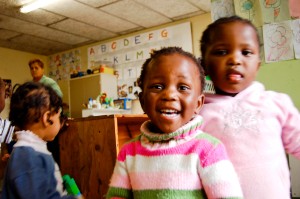
Landa and Veronica
When I walk into the building on Wednesday and Thursday mornings their laughter is the first thing I hear. It’s hard not to smile when you are surrounded by small children calling out to you, “Auntie Auntie Auntie!” or “Auntie Cate!” I get hugs and kisses and some not so gentle tugging on my hair. Some days we play with blocks, or color, or tell stories. There are always diapers to be changed, potty breaks, toys to be picked up, someone to ask why they’re crying, and lots of smiles. Their rush to the door when I come in the morning (each determined to be the first to wrap their small arms around my leg) has become an endearing, albeit bad habit.
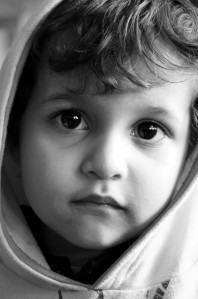
Justin
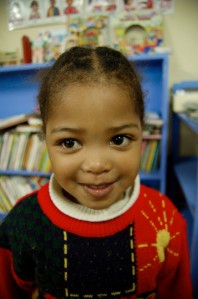
Ruche
But today, I was glad for the change. Thankful for the solace. “If you could just go through and mark here what we have, and make a list. Then, maybe we can make a spread sheet and put it on the door, so we always know what’s in stock.” She wrote: “product name” and “quantity” out on a sheet of computer paper, and then looked up at me.
“No problem” I responded. “This shouldn’t be too difficult.”
“Is it?” She smiled. This seems to be the general response to anything when talking to an Afrikaans speaker. So I smile back, knowing the question doesn’t require a response. She hands me the key, and runs off to deal with something else.
“Ok.” I looked around the small store closet. Twelve meters deep, and about seven meters across, the room was lined with makeshift wooden shelving. There were boxes on the floor, cans tucked here and there, and a robust spider population. I began systematically, starting at the bottom and working my way up. I soon realized that there was peanut butter in 4 different locations, some of the cans expired up to 5 years ago, and I had no idea yet what was stashed in the stacks of crates or boxes under the shelves. …New plan: First organize then inventory.
Three hours, much humming to myself, shifting of boxes and squishing of arachnids later, I was left with a pile of expired goods, and full shelves.
“Wat doen jy?” I turn around to see Gabby standing in the doorway.
“Reorganizing the store. How was school today?”
“Well. What’s this?” She points to the pile of cans and assorted items at the door.
“Expired stuff.” Then noting her confused look, “It’s old.”
“How do you know?” She said, picking up a can, and turning it around in her small hands. I bent down, and pointed to the faded numbers on the bottom of the halved peaches. “Wat doen hulle sê?”
“Well, it says June 2007. See?” She looks up at me.”Well you’re seven and a half now, right Gabriella?” She nods. “Well you were 5 and a half when this went old.”
“Oh. And this?” She picks up another can. And after that one, another. Moving into the store she picks up another can. “And this is good? What is this?”
“Lentils” I smile down at her.
“And this?”
“Well what do you think it says?” I ask. Turning it into a small reading lesson. Running my finger along the underside of the word. “What letter is this?”
“B”…”be”…”bea”…”beans!” She looks up anxiously. “And these are good?!”
“Yes, those are good.”
“Do you want to hear a storie?” She asked, deserting the creamed corn in her hand.
“That would be nice.” I said, the way you do when you are indulging.
“I use to have a brother.” She began. “He was just a baby, a baba” she uses her hands to demonstrate his small size. “Then I was playing outside, and doing my maths, and Mamma was cleaning. ‘N mi baby brother got za knife off the table. And he cut himself. Like this.” Her index finger traces across her cheek and over her neck, stopping just short of the opposite shoulder. “And we came back in and my brother was dead. So we had to go to sleeps, and then the coroner came, and when I woke up my brother was gone. I was six when I went to the funeral.” She pauses, then: “Is that my sjokolade?”
Looking around, “No, those aren’t your chocolates.”
Snapshots
Monday morning came too soon. I heard the clank of the front gate, and the click of the second. Then the three beeps as the door opened. Pearnel’s jovial voice carried through the hallway. Shoot.
10 minutes later five of us piled in the van, me holding the yogurt container I had dumped some granola, honey and cinnamon into moments earlier. We sat in silence as we drove along the now familiar route out of Cape Town. “We’re going to drop Charlie and Domonique off at their sites ya, before we go to UWC ya” Pearnel answers our unasked question. We steer off the N2 and begin to wind our way through Nyanga and into Gugulethu. While it’s no longer shocking to drive through the townships, it is still stirring. Women stand in the yards outside of the shacks hanging the wash in the morning sun. Children too young to go to primary school run along the streets or are strapped to their mother’s backs by blankets. The men walk in the streets, and talk outside the spaza shacks (grocery place). The women begin to set out beadwork and sewing they have done on the tables in the center of the township, and heavy smoke pours into the sky from the braai market (somewhat equivalent to a BBQ). Tables are set out in front of homes, stacked with goat heads for sale, and people wait at the side of the road to catch a public taxi to work in the city.
It would be easy to say they are the most impoverished. Statistics run lists in my head: 70% unemployed, 63% never matriculate, on average 5 murders per day, ramped alcohol and drug abuse, rape, molestation, child abduction, all daily events. And yet, the faces of the children and women show love. There is laughter, and friendship and warmth. Great pride is taken in some of these homes, and in their families.
On our way back from UWC, we drove back through to pick up Brian and Nora from their schools in Gugulethu. The windows were down, as it was nearly 80*, and I hung my arm out of the small green Toyota. As we passed people, I tried to imagine what their days looked like. Most of them likely drug on in an endless monotony. They live somewhere outside of formal time, yet trapped in the confines of social depravity. As we pull through the gates of the school, the children, all dressed in uniform, wave and smile. While we wait the girls laugh, and come up to the window saying: “Molo Mama!” waiting to see whom we smile and wink at first; some sort of small competition for affection. It’s a place I don’t want to stay, and yet I don’t want to leave. We are as blessed to come in, as they would be to get out.
Later this afternoon riots broke out in Nyanga in response to the nurse’s strike. Gunfire, tires slashed and burned, fear and rage created mass chaos in the streets we drove today. Hearing this community rocked by such overt violence makes the effects of apartheid all the more repugnant. Who first thought it acceptable to teach these people that their lives were disposable, and that violence is the road to freedom?
“We are not yet free; we have merely achieved the freedom to be free, the right not to be oppressed. We have not taken the final step of our journey, but the first step on a longer and even more difficult road. For to be free is not to merely cast off one’s chains, but to live in a way that respects and enhances the freedom of others” –Nelson Mandela 1994
…
I have discovered why superhero’s wear spandex. It is not because it is an easier material to sew a large letter to the front of, nor the variance of neon colors it is available in (thanks to 80’s pop fashion). Rather, when covered in synthetic rubber that suction cups to the skin, you feel impervious to all but two things: discomfort and heat.
The 15 of us stood around in our wetsuits and helmets, waiting for someone to either laugh or tell us what to do. The drive up had been stunning. Though there were six of us crammed in the covered flatbed of David’s (our landlord with a history in trail guiding) truck, and our butts were numb, it was rather enjoyable. The Palmiet river lies about an hour and fifteen minutes south of Cape Town. The road curves around the coastline, offering beautiful views of the cape and mountains. Then the road turns in, heading into a gorge carved out by the river. The landscape is a mix of lime green, emerald, white and grey from the granite, and cloudless blue. The mountains jut up out of the earth like they were caught in Zeus’s clap, and the Palmiet runs amber with rust.
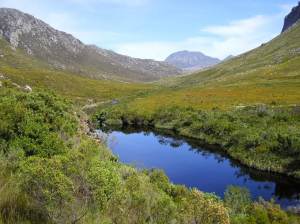
Thank you Ecoafrica.com --Sorry there are no original pictures from this day guys. Unlike me in a wetsuit, my camera does not have white water rafting skills.
“Two to a boat” the guide said. Terry smiled at me. “We are going to carry the boats up this path to the pool up there. Right above that big rapid. Usually one person carries the oars, and the other carries the boat over their head.” I looked at Terry.
“Cate, you want to carry the oars?” He offered.
“Thanks Ter-bear!” I beamed back.
As we headed down the sandy path, the bushes came up over our heads. Is this why they were called the bush people, I muse absent mindedly. It was easy to imagine someone walking down to the river, 7,000 years ago, and thinking they had found eden.
We get up to the pool, plop in our boats, and proceed to row upriver. “Ok, now we are going to practice flipping the boat.” The guide said. So we row up, catch the fast moving current and pull in one direction, until we capsize. The water was shockingly cold. We came up sputtering and struggling hard to get out.
It is at this point, no sooner, that I began to reconsider my decision to go rafting. Me, who avoids pools because I dislike being wet. Not that I don’t know how to swim (I was a lifeguard one summer), but would rather just stay dry if that’s an option. But as I previously explained, in a wetsuit you are impervious almost everything, including dislikes. And, being in the possession of such power, discomfort was a small price to play. I am also happy to report that the only other time I was thrown from the boat was not an act of the river. Rather Terry’s idea of a joke, as I lounged sideways in our raft while we floated in a gentle section. In truth, I had a hard time not laughing as I pulled my way back into the boat to inform him that we were now, “In a fight.”
It took us a few rapids to understand how to properly move the boat through the river, between the rocks and away from the trees. Once we got the hang of it, it was like an unpredictable splash mountain without the singing figurines.
All too quickly we were pulling our boats out of the water, and carrying them back up to the main road. As we piled our wetsuits, booties, and helmets in the grass, and returned to our pedestrian clothes, David passed around a bottle of Sherry. “To make the ride back a little more comfortable” he explained jokingly. But after a day like today, what were a few awkward positions and tingling knees?
A Mountain for Madiba
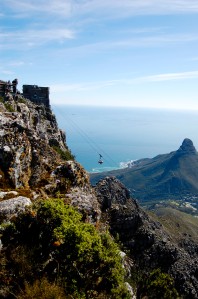
July 18th. Nelson Mandela’s birthday, and a national holiday here in South Africa. A symbol for democracy, charity and human equality, Nelson represents everything this country hopes to become. In preparation the Cape Times has been publishing stories on the events of the day for a week. Local news stations were in a race to discover Mandela’s whereabouts on the day, and the government promotes the newly established traditions. Mr. Moclantha (acting president while Jacob Zuma was in Italy at the G8 Summit), spoke to parliament on July 8th, saying: “[We] need to ensure that we spend at least 67 minutes of our time on Madiba’s birthday engaging in meritorious activities. In those 67 minutes, every individual should be involved in reawakening the spirit of human solidarity. It is through helping others that our ability to deal with our own problems and challenges will be enhanced.”
We woke up early. Early for 19 college students on Saturday. The sun was barely brushing the rooftops and the house was a buzz. Conversation was minimal as we gathered around the table with cereal, toast, and eggs. We packed some peanut butter and jelly sandwiches, toasted of course, and bottles of water. With our hiking boots and shorts we marched up to Lower Main to catch a public taxi (Combi) to Table Mountain. People passing laughed at us: “Crazy Obama kids with bare legs in winter!” It was 72* on this chilly winter morning.
As we rounded the base of the mountain Theresa (ever chipper) turns in the van to give us all “pump-up high-fives.” We asked our taxi driver to take a group picture, and then we were up, up and away. The trail winds through a gorge. Carved from large blocks of rough granite, the effect is much the same as an hour and a half on a giant-scaled stair stepper. Slightly out of shape, we stopped a few times to “take in the view,” and snap a few pictures.
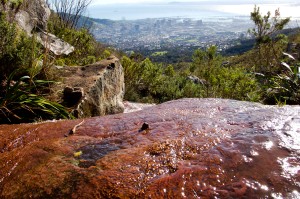
Waterfall on the hike up
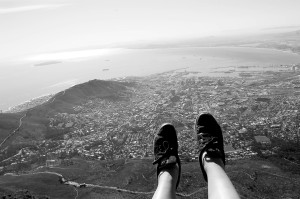
Over the Cape Town
After some reading, basking in the sun, and friendly banter it was time to climb back down; a surprisingly less enjoyable task than climbing up. We reached the beach just in time to grab some soup and sit in the sand as the sun set over the Atlantic. Our exhaustion catching up with us, we hopped in a combi, and bumped and jostled our way back to Obs.
Brian came into my room and sat on the hard wood floor. Happy I’d just swept, “What’s up Bry-Bry?” “Today was a good day” he replied. It was. It had been a wonderful day. But we’d neglected our 67 minutes of service. “Sometimes I think that you have to first enrich yourself. The more that you have, the more that you have to give.” He said.
So Madiba, for your birthday we climbed a mountain. It took us 5 hours and 47 minutes to complete our journey, and we came back enlightened. We came back down to “reawaken the spirit of human solidarity.”
A Waiting Game
Winter has settled into Cape Town. The rain plays a constant marimba at our windows. The damp chill it brings oils in, like an unwelcome relative, burrowing into your sheets and clothes. The missing panes in the back doors have become more of a public enemy than Jacob Zuma in Kimberley. Because 19 college students seem incapable of figuring out how to operate the coin slot dryer, our clothes hang on racks for days, drying. I washed the jeans I plan to wear on Friday, Tuesday morning so even the pockets would have time to evacuate the water.
Classes at University of Western Cape have begun, and we are all trying to understand the intricacies and how no one seems to know anything. Everything is done on paper, and always in a “different department.” “Go to the Department of Arts” they say. So we go, stand in line for an hour and a half, only to be told that they “do not have us in the system,” or “that’s not here.” The campus is large, and beautiful (like everything else here). Originally, UWC was a designated colored school. Regardless if you were from Durban or Jo-berg, if you were classified as colored, and wanted to study at university, UWC was your new home. When apartheid ended, the university was opened to everyone. And now, it’s open to us.
While the process of registering has us all trekking the 3.5 blocks to Babo for cosmos and Black Lable when we get home, it also has been an interesting lesson in “South Africa time.” This is a city with several different definitions for “now.” “Now sometime”= Sometime in the near future, possibly today. “Just now”= Definitely today, and hopefully in the next few hours. “Now now”= Right now (a.k.a in 15-20 minutes).
P.S. If you liked the previous post “Me and South Africa Go Good Together,” feel free to visit www.terrymcgrath.wordpress.com for similar styling.
Me and South Africa Go Good Together!
I am lovign it here! South Africa has taught me this: To love is to live and to live is to thrive and to thrive is to belong and to belong is to engage spiraling together to create wellness.